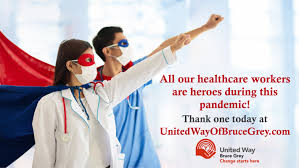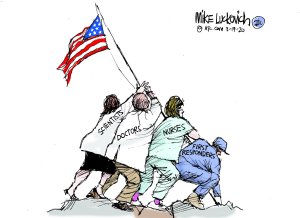The COVID-19 outbreak has been devastating to individuals all over the world. But how hard has it impacted those who work the front lines of healthcare? In the United States alone many states have gone forward with building outside healthcare facilities to keep up with the rushing demands of inpatient care. Healthcare workers including assistive positions, nursing, and doctors are all feeling the impact and as this winter season begins it does not seem to have any intentions of slowing down. With health care workers having to treat the patients day in and day out in person they are at the highest risk for contracting the virus. At some point in many states, the curve for the number of patients contracting the virus had begun to decrease, but the demand for healthcare professionals has not.
What are our healthcare workers facing?:
Can you imagine working day in and day out and taking on the role of the nurse, friend, and family of a patient because of the limitations with many hospitals not allowing any visitations for patients. This has been initiated to follow the guidelines in place by the CDC to help prevent further spread of the virus. Although visitors are limited, our nurses, doctors, and healthcare staff must remain in contact with these patients and are putting their own health at risk to help save the lives of those around them. It is both honorable and commendable. to think they have to wake up every day and decide to put someone else life before their own, would you be able to do this?
We must begin to take a moment and realize as a society what it is that our healthcare workers are facing every day when treating a COVID-19 positive patient. Nurse all over the United States, in particular, are in high demand to the point that we are actually experiencing a nursing shortage within the United States. The need is so severe that many nurses are working hours that would normally be considered inhumane or against many healthcare facilities rules but because the virus continues to spread and increase cases they are forced to do so. Fatigue, exhaustion, burnout, and depression are some of the various symptoms healthcare workers are dealing with day in and day out of work. The positions these individuals hold not only cause a strain on their mental health but it is also affecting their social and family relationships. With limits set in place in many states to follow social distancing regulations, many healthcare workers are not able to come into contact with their own families or friends. Many often come home to a set room or area in which they quarantine to prevent any possible chance of spreading the virus to their loved ones. This means many times they are heading home to be isolated alone and no one to talk to about the stress and frustration they have dealt with throughout the day. Healthcare worker deaths are increasing and from the looks of things, the spread of the coronavirus does not have any plans to slow down any time soon.
What can we do to help our healthcare workers?:
What can we be doing to lessen the burden of stress and frustration for our healthcare workers? For starters following the most important protocols set by the CDC can help to try and lessen their work load. The CDC recommends the following as the best ways to prevent the transmission of the COVID-19 vaccine which are hand washing, 6ft. social distancing and using face mask daily. We can also ensure that we make it a point to help replenish our healthcare workers whether it is by calling them and giving them an ear to vent to, or pick up in areas where you can help to relieve some stress for them such as taking care of the household, children, schooling with children, preparing meals, laundry and other outside responsibilities a healthcare worker may be overwhelmed with when they are not at work. Make it a point to show gratification and show your healthcare workers that they are appreciated and their efforts do not go unnoticed can help to make them feel some sort of appreciation for all of the fatigue and stress they are enduring throughout this pandemic. Simpleefforts and changes like these can help to ensure our healthcare workers are maintaining a health mental state and keeping their mental state at ease so that they can continue to care for individuals who have contracted the CVOID-19 virus. Overall we must make the choice to fight for our healthcare workers the way they choose to fight for us daily.


Referrences:
Punzo, A. J., & Forrest, M. T. (2020). COVID-19: A Review of Preliminary Clinical and Pathologic Findings. American Journal of Homeopathic Medicine, 113(2), 16–22.
Birkmeyer, J. D., Barnato, A., Birkmeyer, N., Bessler, R., & Skinner, J. (2020). The Impact Of The COVID-19 Pandemic On Hospital Admissions In The United States. Health Affairs. doi:10.1377/hlthaff.2020.00980
Wasim, T., Raana, G. e, Bushra, N., & Riaz, A. (2020). Effect of COVID-19 Pandemic on Mental Wellbeing of Healthcare Workers in Tertiary Care Hospital. Annals of King Edward Medical University, 26, 140–144.

Thank you for focusing on the toll these policies are taking on healthcare workers. I do believe a big piece is missing under ‘how can you help?’. May states are currently under waivers that allow anyone to take a FREE online class to be a temporary nurse aid – a CNA. In this area this is where the biggest need is. We also have a waiver that has reactivated state nursing licenses from the last 5 years. Meaning any nurse to hold a Kansas nursing license as far back as 2015 can now practice as a nurse without paying fees or taking classes to reinstate their license. Despite these orders from the Governor, we still face staffing shortages in these rural communities.
It is common practice for our workers to work in multiple facilities, working 3 days a week for 12 hours in one town, and 2-3 days a week in another town. Due to the policies that are no longer ‘allowing’ staff to work in multiple facilities – it has caused a ‘price war’ with hourly compensation leaving the smaller facilities (under 45 bed) with even less staff. The smaller facilities just don’t have the income of resources to offer higher hourly compensation without going into the red as a company.
On the employee side, it has caused a financial burden to lose working hours in one facility, however working more hours in the other (sometimes 36 hours in a row). This is causing the over stress symptoms mentioned in the clip. “Fatigued beyond fatigued” is an understatement.
As mentioned in the clip, employees also face the remote schooling issue. In contrast to the clip, completing school after a shift is over is not an option here. The schools are completing synchronous learning through visual media, such as Zoom. If the child is not there with the mic and camera on during class, they are marked absent. This has caused much of our workforce to resign from healthcare to ensure their children are educated.
From what I have seen first hand, in my facility, from my employees, and from my friends that are healthcare workers – the frustration is not “the public”. In this small rural world, the frustration is the POLICIES and the hypocrisy. The isolation and quartines DO NOT apply to health care workers. if you have a positive test for COVID-19 but have no symptoms – you are expected to work. Hospitals have dirty masks littered outside blowing around the parking lot but the hospital CEO is in favor of another shut down to ‘slow the spread’, Walmart shopping is ok, but going to your locally owned coffee shop is ‘dangerous’. School grades 6-12 are ‘remote’ learning, but K-5 are in session – because their is no good way to complete school with working parents. The list goes on.
To add to the stress and confusion the state has no relief of utilities, they can’t shut them off, but late fees and fines are being added every day its not paid.
The policies surrounding the virus in the name of “public safety” are a complete mess and are tearing the families of healthcare workers apart.
Thank you for shedding light on what healthcare workers are facing right now during the virus. As an Occupational Therapy Assistant, I can say that what you laid out in this blog is true. For instance, I have been the only one some patients have seen since March or April. I became closer to my patients; some will call me family, their best friend, and sometimes I am the only one to listen to how bad their day is going. The strain of all this takes a toll on us. When returning home from work, I enter through a separate door, shower, and clean all surfaces that I touched. After almost 7 months of this, I am burnt out and sometimes want to give up, but I can’t because my patients need me because I realize I might be all they look forward to every day.
The article causes many mixed emotions. Fear, anger, frustration, intimidation, sadness are just a few of them. There’s been an overwhelming emphasis on dealing and treating COVID patients, but I feel there has been little to nothing done to recognize and mitigate the problems impacting those on the front lines. I remember Governor Cuomo saying early on that the cure for the virus cannot be worse than the virus itself. Without a definitive cure in the Spring of 2020, there was nothing to help treat patients besides nurses and doctors. Unfortunately, those performing the treatment services would end up suffering from loneliness, depression, and alcohol and substance abuse. In some cases there were even reported suicides. As a COTA , I’m considered an essential worker and have been working in facilities with many COVID positive patients. I get tested regularly and I try to remain diligent about washing my hands and changing my clothes on the way home but it is very exhausting. We do this because we’re good at the core and have an obligation to help others. I do fear however that once the dust settles and the actual cure comes along, everyone will forget how much of a critical role those on the front lines played and they’ll carry on with their lives as normal. I also think its critical that new services be implemented to help treat those who are suffering from conditions related to working with COVID patients.